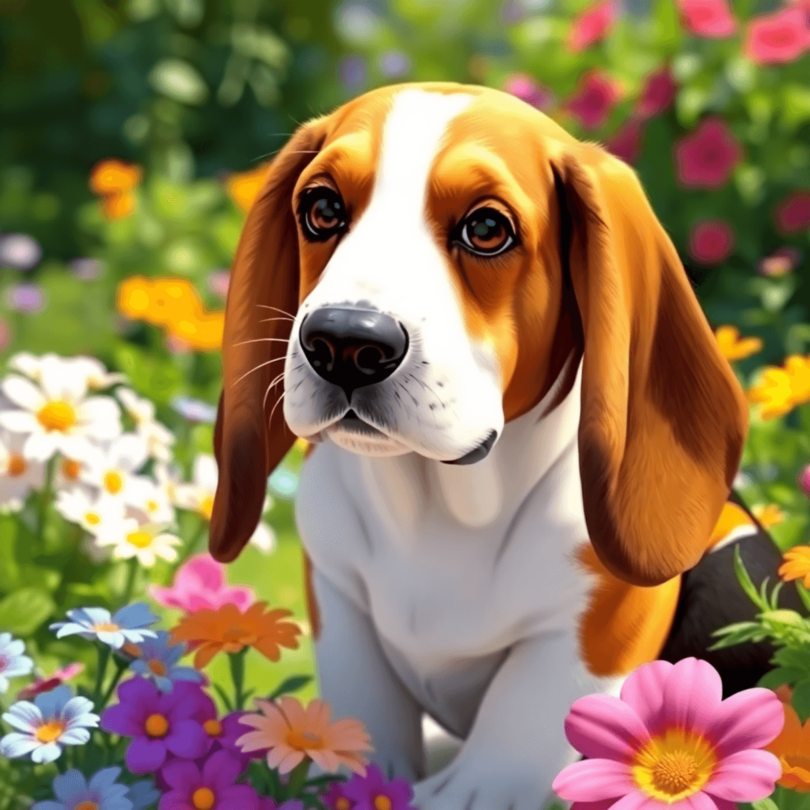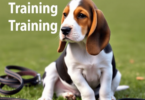Introduction
Welcome to the Basset Hound: The Ultimate Guide! Are you ready to dive into the world of this adorable breed? The Basset Hound, with its distinctive appearance and gentle temperament, has captured the hearts of many pet lovers. Known for their droopy ears and sad expressions, these lovable dogs are not just cute; they are also incredibly devoted companions.
Here’s what makes the Basset Hound breed so popular:
- Affectionate Nature: Basset Hounds are known for their sweet and gentle disposition.
- Family-Friendly: They get along well with children and other pets, making them ideal family dogs.
- Unique Characteristics: With a low stature and a strong sense of smell, they stand out in any crowd.
This article aims to provide a comprehensive guide to understanding and caring for Basset Hounds. From their rich history to grooming essentials, we’ll cover everything you need to know about these delightful dogs. Whether you’re considering adding a Basset Hound to your family or you’re already a proud owner, you’ll find valuable insights throughout!
Breed History
What is a Basset Hound? This lovable breed is defined by its short stature and long, droopy ears that give it an endearing, yet somewhat sad expression. Originating from France and Belgium, the Basset Hound’s name comes from the French term basset, meaning “low”. This charming canine was developed in the late 19th century primarily for hunting small game, such as rabbits and hares.
Purpose as Scent Hounds
Basset Hounds belong to the scent hound category, which means they possess an exceptional sense of smell. Their unique anatomy—short legs and elongated bodies—allows them to navigate through dense underbrush with ease while following scents.
Historical Roles
- Initially bred by monks in monasteries for tracking game.
- Gained popularity among aristocrats who enjoyed hunting parties.
As their reputation grew, so did their presence in various countries. By the early 20th century, Basset Hounds made their way to the United States, where they quickly captured the hearts of dog lovers and became a cherished companion breed.
Their gentle temperament and playful nature have solidified their status as beloved family pets globally. Understanding this rich history helps appreciate why Basset Hounds are not just adorable companions but also skilled hunters with a legacy spanning centuries.
Physical Characteristics of Basset Hounds
Basset Hounds are undeniably charming with their unique physical characteristics. Here’s a closer look at what sets them apart in the canine world:
Size and Weight
- Height: Typically, Basset Hounds stand between 11 to 15 inches tall at the shoulder.
- Weight: Their weight ranges from 45 to 65 pounds, depending on gender. Males tend to be larger than females, adding to their robust appearance.
Distinctive Features
- Large Head: Basset Hounds boast a large, rounded skull that gives them an adorable and somewhat comical look.
- Droopy Ears: One of their most defining traits is their long, droopy ears, which can reach up to ten inches in length. These floppy ears help capture scents as they sniff around.
- Sad Expression: Their loose skin contributes to a slightly melancholic yet endearing expression that many find irresistible.
Coat Types and Colors
Basset Hounds have a short, dense coat that requires minimal grooming. Common colors include:
- Tri-color: A classic combination of black, white, and tan.
- Lemon: A lighter shade featuring tan and white.
- Red & White: A striking combination that showcases their beautiful hues.
These characteristics not only contribute to the breed’s overall appeal but also play a role in their purpose as scent hounds. Understanding these features helps potential owners appreciate the unique charm of the Basset Hound breed.
Interestingly, while Basset Hounds have distinct physical traits, other breeds like the Schipperke also possess unique characteristics that set them apart in the canine world.
Temperament and Behavior Traits of Basset Hounds
Basset Hounds are the embodiment of gentleness and devotion. Their affectionate nature makes them delightful companions, known for forming strong bonds with their families. Here are some key personality traits that characterize this lovable breed:
1. Gentle Giants
Despite their stocky build, Basset Hounds possess a sweet demeanor. They are patient and laid-back, making them perfect for families or individuals seeking a calm pet.
2. Devoted Companions
Loyalty is a hallmark of the Basset temperament. They thrive on companionship and will often follow their humans around the house, offering that warm, droopy-eyed gaze that melts hearts.
When it comes to family life, Basset Hounds shine in interactions with children and other pets:
1. Kid-Friendly
These dogs are generally gentle and patient with kids. Their playful yet easygoing nature allows them to be great playmates, making playtime fun without being overly rambunctious.
2. Social Butterflies
Basset Hounds tend to get along well with other pets, provided they have been properly socialized from an early age. Their friendly disposition means they enjoy sharing their space with other animals, whether furry or feathered.
The Basset Hound temperament showcases a blend of affection and sociability. They offer unwavering love and joyful companionship to anyone lucky enough to welcome this breed into their home. A Basset Hound truly embodies the essence of family life and connection!
Exercise Needs
Basset Hounds may have a laid-back demeanor, but they still require regular exercise to stay healthy and happy. Their exercise needs can be summed up in a few key points:
- Daily Activity: Aim for at least one hour of physical activity each day. This can include brisk walks, playtime in the yard, or interactive games.
- Mind Games: Incorporating mental stimulation is equally important. Puzzle toys or scent games can keep their noses and minds busy, which is essential for this scent hound breed.
- Short Bursts: Basset Hounds tend to benefit from shorter bursts of activity rather than long stretches of exercise. Frequent short walks or play sessions help prevent boredom and maintain their motivation.
While Basset Hounds are not high-energy dogs, they do enjoy exploring their surroundings. A well-exercised Basset is less likely to exhibit destructive behaviors stemming from boredom.
Keeping your Basset Hound active ensures they remain fit, reduces the risk of obesity, and contributes to their overall well-being. The right mix of physical and mental activities will make for a delighted droopy-eared companion!
Training Challenges with Basset Hounds
Training a Basset Hound can be an entertaining yet slightly challenging adventure. Known for their stubborn streak, these lovable droopy-eared companions might not always be eager to follow commands. Their independent nature stems from their history as scent hounds, where they often relied on their instincts rather than obedience.
Key Training Considerations
- Stubbornness: Basset Hounds possess a strong will, making them less than enthusiastic about following orders. This breed requires a patient approach, as they may take their time understanding commands.
- Firm Techniques: Consistency is key when training Basset Hounds. Firm yet gentle guidance helps establish boundaries. Positive reinforcement methods work wonders; rewards like treats and praise motivate these pups to learn effectively.
Tips for Success
- Short Sessions: Keep training sessions brief—about 5 to 10 minutes—to maintain their attention and enthusiasm.
- Engaging Activities: Incorporate fun activities or games during training to stimulate their minds and keep them engaged.
- Socialization: Early socialization plays a crucial role in shaping behavior. Expose your Basset Hound to various environments, people, and pets to help them adapt and thrive.
Using these strategies can make the training process enjoyable for both you and your Basset Hound. Building a strong bond through training not only fosters good behavior but also enhances the joy of having this affectionate breed as part of your family.
Care Requirements for Basset Hounds
Caring for a Basset Hound involves understanding their exercise needs, which are crucial for maintaining their health and happiness. These lovable companions thrive on daily physical activity, requiring at least one hour of exercise each day.
Daily Physical Activity Requirements
- Walks: Regular walks not only help keep them fit but also provide mental stimulation and socialization opportunities.
- Playtime: Engaging in playtime with toys or games fosters bonding and keeps their spirits high.
- Sniffing Adventures: Basset Hounds have a strong sense of smell; allowing them to sniff around during walks satisfies their natural instincts.
Types of Exercises Suitable for the Breed
Basset Hounds enjoy a variety of activities that cater to their unique physique:
- Leashed Walks: Short distances on a leash are ideal due to their short legs.
- Fetch: A gentle game of fetch can excite them without overexertion.
- Puzzle Toys: Interactive toys challenge their minds and keep boredom at bay.
Understanding the exercise needs of Basset Hounds ensures they remain healthy, happy, and well-adjusted family members. Regular physical activity combined with mental engagement makes all the difference in their overall well-being.
Grooming Essentials for Basset Hounds
Caring for your Basset Hound’s grooming needs is crucial to keeping them healthy and happy. Here’s what you need to know:
Shedding Patterns and Brushing Frequency
Basset Hounds are notorious for their shedding habits. Their short, dense coat sheds year-round, with increased shedding during seasonal changes. To manage this:
- Brush at least once a week: A slicker brush or rubber grooming mitt works wonders for removing loose hair.
- Expect more frequent brushing during heavy shedding periods to keep fur under control and minimize mess.
Bathing and Ear Cleaning Tips
Bathing your Basset Hound doesn’t need to be a chore. Aim for a bath every few months or as needed when they get particularly dirty. Here are some tips:
- Use a mild dog shampoo: This keeps their skin healthy and avoids irritation.
- Make sure to rinse thoroughly to prevent any leftover soap from causing skin issues.
Basset Hounds have droopy ears that require special attention:
- Check ears weekly: Look for dirt or wax buildup.
- Clean gently with a vet-recommended ear cleaner: Use cotton balls or gauze, avoiding Q-tips that could push debris further in.
With regular grooming, your Basset Hound will shine like the star they are!
Dietary Requirements for Basset Hounds
Basset Hounds have specific dietary requirements that are essential for their health and well-being. Understanding the right food types and portion control can significantly impact their longevity and quality of life.
Recommended Diet Types
-
Dry Food (Kibble): A popular choice due to its convenience and dental benefits. Look for high-quality brands with meat as the first ingredient.
-
Wet Food: Often more palatable, it can be mixed with dry food to enhance flavor. Ensure it meets nutritional standards for a balanced diet.
Portion Control
Maintaining an ideal weight is crucial since Basset Hounds are prone to obesity. Implementing portion control strategies will help keep your furry friend fit:
- Follow guidelines on the dog food packaging based on your dog’s weight and age.
- Measure out servings using a standard measuring cup to avoid overfeeding.
- Monitor body condition regularly; consult your vet for personalized recommendations.
By providing a balanced diet tailored to their needs, you can help ensure that your Basset Hound remains energetic and healthy throughout their life. Remember, consistency is key in maintaining their dietary regimen!
Health Considerations in Caring for Basset Hounds
Basset Hounds, like any other breed, have specific health concerns to watch for. Understanding these common issues can help owners provide the best care possible.
Common Health Problems
- Hip Dysplasia: This genetic condition affects the hip joint and can lead to arthritis. Regular check-ups can help identify this early.
- Dental Problems: Basset Hounds are prone to dental issues due to their unique mouth structure. Maintaining oral hygiene is crucial; regular brushing and vet check-ups can prevent serious problems.
Preventative Care Strategies
Implementing effective preventive measures can enhance your Basset Hound’s quality of life:
- Regular Veterinary Care: Routine check-ups ensure that any developing health problems are caught early. These visits may include vaccinations, dental cleanings, and screenings for hereditary conditions.
- Balanced Diet and Weight Management: Keeping your pup at a healthy weight reduces the risk of obesity-related issues like diabetes and joint pain.
- Exercise: Adequate physical activity strengthens muscles and supports joint health. Aim for at least one hour daily to keep them fit and happy.
With attentive care and regular veterinary visits, many health concerns can be managed effectively, allowing Basset Hounds to lead joyful lives full of tail wags and snuggles.
Lifespan and Care Needs of Basset Hounds
Basset Hounds typically enjoy a lifespan of 10 to 12 years, making them relatively long-lived companions in the canine world. To ensure they reach their golden years, regular health care is essential.
Key Aspects of Care:
-
Regular Veterinary Check-ups:
- Routine visits help catch potential health issues early.
- Vaccinations, dental cleanings, and wellness exams should be scheduled at least once a year.
-
Monitoring Weight:
- Keeping an eye on their weight helps prevent obesity-related conditions.
- A balanced diet combined with regular exercise is vital.
-
Dental Care:
- Dental hygiene significantly impacts overall health.
- Regular brushing and vet check-ups can help thwart dental diseases common in Basset Hounds.
-
Preventative Measures:
- Discuss with your vet about preventative treatments for parasites like fleas and ticks.
- Screening for genetic conditions can also be beneficial.
Understanding these care requirements will empower you in providing the best life for your Basset Hound. This knowledge aligns perfectly with the comprehensive health care information for pets that every responsible owner should possess. Embracing these practices ensures your furry friend thrives well into their senior years, adding joy to your family life!
Is a Basset Hound Right for You? Factors to Consider Before Getting One as a Pet
Thinking about welcoming a Basset Hound into your home? Let’s weigh the pros and cons of owning this lovable breed.
Pros of Owning a Basset Hound
- Affectionate Companions: Their loving nature makes them great cuddle buddies.
- Friendly with Children: Basset Hounds are gentle, making them suitable for families with kids.
- Adaptable: They can thrive in various living conditions, including apartments, as long as they get their daily walks.
- Minimal Grooming Needs: Their short coat requires little maintenance, making grooming a breeze.
Cons of Owning a Basset Hound
- Stubborn Streak: Training may require extra patience due to their independent nature.
- Separation Anxiety: These dogs prefer companionship; leaving them alone for long periods could lead to distress.
- Exercise Requirements: While moderate, they do need at least an hour of activity daily to stay healthy.
Ideal Living Conditions
Basset Hounds adapt well to different environments. They enjoy comfortable indoor spaces and appreciate outdoor time. A secure yard or access to parks is ideal for their exercise needs.
Family Compatibility: Are They Good Family Dogs?
Absolutely! With their sweet disposition, they are known as great family pets. Their adaptability shines through in family life:
- Interaction with Children: Known to be gentle and tolerant, they become beloved playmates for kids.
- Compatibility with Other Pets: Generally friendly, Basset Hounds can coexist with other animals when properly socialized.
Before making the decision, ask yourself Is a Basset Hound right for me? If you’re ready for a devoted companion who embodies all the charm of the Basset Hound dog breed, then you might just find your perfect match!
FAQs (Frequently Asked Questions)
What is a Basset Hound?
The Basset Hound is a breed of dog known for its distinctive features, including a large head and droopy ears. Originally bred as scent hounds, they have a rich history and are popular as affectionate pets.
What are the exercise needs of Basset Hounds?
Basset Hounds require daily physical activity to maintain a healthy weight and overall well-being. Suitable exercises include leisurely walks and playtime, but they should not be over-exercised due to their short legs.
How do I train a Basset Hound?
Training a Basset Hound can be challenging due to their stubbornness. It’s important to use firm training techniques and positive reinforcement. Consistency and patience are key to successfully training this breed.
What grooming is required for Basset Hounds?
Basset Hounds have moderate grooming needs. They shed regularly, so brushing should be done weekly to manage shedding. Bathing should be done as needed, along with regular ear cleaning to prevent infections.
Are Basset Hounds good family dogs?
Yes, Basset Hounds are known for their gentle and loving nature, making them great companions for families. They generally get along well with children and other pets, adapting well to family life.
What health considerations should I be aware of when caring for a Basset Hound?
Common health issues in Basset Hounds include hip dysplasia and dental problems. Regular veterinary check-ups and preventative care strategies are essential to ensure their health and longevity.



